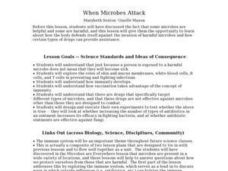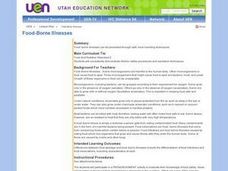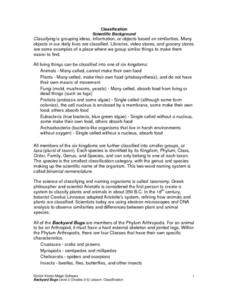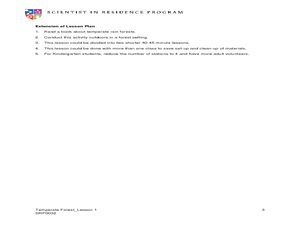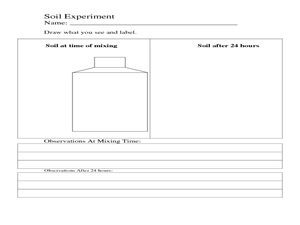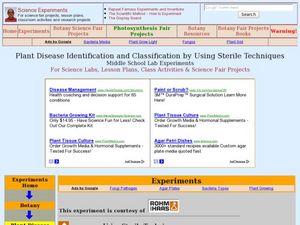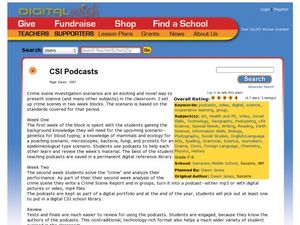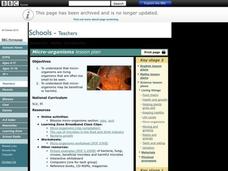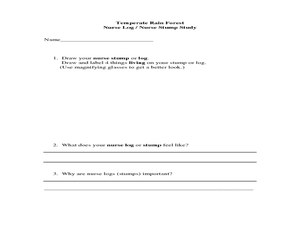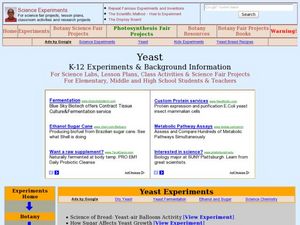Curated OER
Case of the Missing Pumpkin
Young scholars explore the process of decomposition. For this science lesson, students carve a pumpkin and observe as it decomposes. Young scholars compare the changes to an uncarved pumpkin. Students write about the disappearing pumpkin.
Children’s Hospital of Philadelphia
Understanding How Diseases Spread
To boost disease prevention, high schoolers arm themselves with information about infectious diseases and how they spread. Scholars research the causes, prevention techniques, and identify high-risk groups especially vulnerable to a...
Curated OER
Science and Art Museum
Imagine each one of your learners on task and interested in scientific material. Learners investigate science related art by creating a small museum! Using digital cameras, pupils photograph different scientific actions that look...
Curated OER
When Microbes Attack
Learners study how the body defends itself against the invasion of harmful microbes and how certain types of drugs can provide assistance. They design and execute their own experiments to test whether increasing the number of types of...
Curated OER
Producers and Consumers
Pupils make lists of producers and consumers and act as consumers that eat producers in a garden. In this producers and consumers lesson plan, students demonstrate a food chain by using a piece of yarn to connect all of them together.
Curated OER
Food-Borne Illnesses
Use this lesson to have your charges consider the differences between food spoilage and food-borne illnesses including the differentiation of food infections and food intoxication, including characteristics of each. Some excellent...
Curated OER
Backyard Bugs
Explore the concept of scientific classification and the similarities and differences between plant and animal species. Your class will participate in hands-on activities by investigating dichotomous keys and classifying their shoes. To...
Curated OER
Diseases
Sixth graders create a type of notebook or journal using colored copy paper on which to take notes. They complete research on a certain disease and report on it and then design their own disease causing bacteria or virus. Finally, 6th...
Curated OER
TE Activity: How Fast Can a Carrot Rot?
Young scholars experiment to define which environmental factors favor decomposition by soil microbes. They decompose carrots in dirt, weigh the carrots periodically to determine how long it takes. They look at how engineers use this type...
Curated OER
How Clean Is Our Water?
Students examine samples of water to determine its cleanliness. They visit a waste treatment plant and/or reservoir. Students explore what protects the water supply from contamination by chemical or organize pollution. They trace the...
Curated OER
Understanding Germs
Students investigate germs. In this health lesson, students use "glow lotion" on their hands and look at them under a black light. Students observe the cleanliness of their hands under the black light.
Curated OER
Exploring Forest Objects
Students explore the forest. In this ecosystems instructional activity, students rotate through sensory activity centers, brainstorm, and read about temperate forests.
Curated OER
Under Our Feet
Young scholars investigate the forest ecosystem to learn of the living and non-living elements of the soil. In this ecosystem lesson, students examine soil for twigs, moss, fungi, leaves, roots and other matter. Young scholars complete...
Curated OER
Growing bacteria
Students investigate the growth of bacteria under the right condition. In this biology lesson, students observe the growth of bacteria and fungi given the perfect condition to grow. They graph the result and investigate where else...
Curated OER
Plant Disease Identification and Classification by Using Sterile Techniques
Seventh graders identify how to use sterile techniques when identifying plant pathogens. In this plant diseases activity students complete a lab activity in which they see how plant diseases are identified and classified.
Curated OER
Compost in a Bag!
Fourth graders experiment to see which objects decompose. In this compost instructional activity, 4th graders observe the changes of labeled objects in a bag. Leave the objects for one month and record the changes by observation and...
Curated OER
CSI Podcasts
Young scholars investigate crime scene scenarios to meet standards. In this crime scene scenario instructional activity, students gather background information during the first week. They investigate topics such as mammals, genetics,...
Curated OER
Micro-Organisms
Students investigate microscopic life by viewing video clips. In this organisms lesson, students view photographs and video clips on the internet of micro-organisms and discuss the harms and benefits of the creatures. Students complete...
Curated OER
Temperate Forest : Pacific Spirit Field Trip
Learners examine nurse logs with hand lenses and identify animals. In this ecosystem lesson, students gain understanding of the rainforest by studying nurse logs. Learners become familiar with vocabulary through their study of nurse logs.
Curated OER
Yeast
Students study the characteristics of yeasts. In this biology lesson, students conduct experiments to measure yeast respiration. They discuss the favorable conditions needed for growing them.
Curated OER
Glucose
Young scholars conduct various experiments on glucose. In this biology lesson, students differentiate the process of diffusion and osmosis. They test different foods for the presence of glucose and starch.
Curated OER
Living or Non-Living
Students examine living and non-living things. In this life science lesson, students are given a group of objects and discuss if they are living or non-living. Students identify and list characteristics of living things.
Curated OER
Soil, Designer Soil: From Rainforests to the Prairie
Students explore the role and importance of soil in the ecosystem. In this Science and Social Studies lesson, students complete an experiment using various kinds of soil and clay and then examine how soil has a direct impact on our...
Curated OER
Water filtration with Plants
Sixth graders explain how soil and plants effect contaminated water in nature. In this filtration lesson plan, 6th graders work in groups to test biofiltration units. Students determine which biofiltration units work best and how they...





